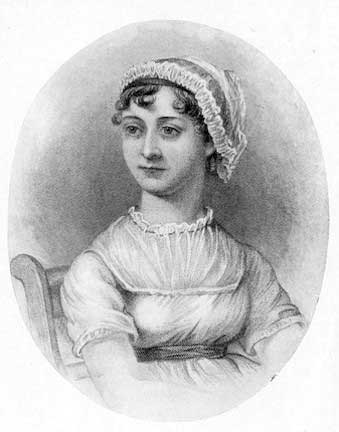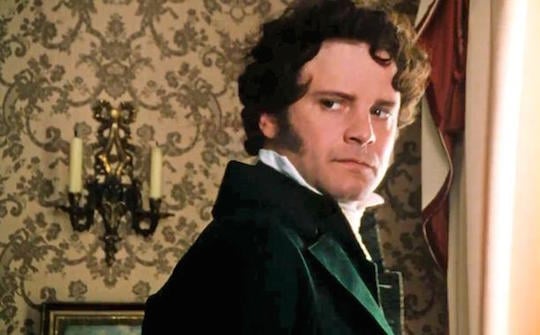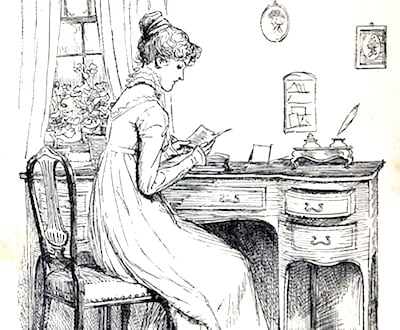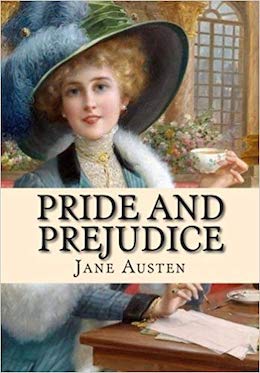A 19th-Century Analysis & Summary of Pride and Prejudice by Jane Austen
By Sarah Fanny Malden | On April 15, 2022 | Updated August 21, 2022 | Comments (0)

Jane Austen by Sarah Fanny Malden (1889) offers an excellent 19th-century view of Jane Austen’s works. The following analysis and plot summary of Pride and Prejudice (1813) focuses on this beloved novel, which was Jane Austen‘s second to be published. It followed Sense and Sensibility, published two years earlier.
The 1889 publication of Malden’s Jane Austen was part of an Eminent Women series published by W.H. Allen & Co., London. The following excerpt is in the public domain:
Pride and Prejudice appeared in 1813 under its new and certainly better title (it had at first been called First Impressions), and Jane’s letters at the time are full of the unaffected interest which she always displayed in her own writings, mixed with her usual keen criticism.
Jane’s opinion of her heroine, and of the first edition of the book is described in a letter to her sister Cassandra:
“I must confess, that I think her (Elizabeth) as delightful a creature as ever appeared in print, and how I shall be able to tolerate those who do not like her at least, I do not know. There are a few typical errors, and a ‘said he’ or a ‘said she’ would sometimes make the dialogue more immediately clear; but ‘I do not write for such dull elves’ as have not a great deal of ingenuity themselves.”
. . . . . . . . . .

Learn more about Jane Austen
. . . . . . . . . .
Elizabeth and Mr. Darcy are both rare characters
No admirer of Elizabeth Bennet will wonder that her delineator could not find a satisfactory portrait of her, for she is a vary rare type of character; indeed, it is a distinguishing characteristic of Pride and Prejudice that both the hero and heroine are uncommon in every respect, and yet thoroughly lifelike.
A shade more of gaiety would have made Elizabeth a flippant, amusing, commonplace girl, just as a degree less intellect would have made Darcy as intolerable as Mrs. Bennet thought him. But Jane Austen had shaken off all tendency to exaggeration by the time she brought out Pride and Prejudice, and henceforth her characters are kept well within bounds.
We see in Darcy the man who has had everything to spoil him yet is really superior of being spoilt. He is handsome, wealthy, well-born, and of powerful intellect, and the adulation and submission he has always had from everyone about him wearies him into receiving such homage with cold indifference and apparent haughtiness, yet under this repellent exterior is a warm, generous, and tender heart, which is capable of great sacrifices for anyone he really loves.
Elizabeth Bennet is exactly the right wife for him, for, with a nature as capable of tenderness and constancy as his, she has all the simplicity, brightness, and playfulness which are wanting in him; yet from the day that she and Mr. Darcy first meet they take a mutual aversion to each other, and long after he has succumbed, and fallen in love with her, she is unconscious of his feelings, and continues to dislike him.
Elizabeth Bennet and her family
Elizabeth lives in Hertfordshire with a clever satirical father (whose pet she is), an intensely vulgar silly mother, and four sisters, of whom only one is her equal and companion: Jane and Elizabeth Bennet are as Cassadra and Jane Austen were to one another.
The Bennets, though well off, are not rich, and the daughters will be very poor, as their father’s estate is entailed to male heirs, and, at his death, goes to a distant cousin.
This arrangement is a perpetual grievance to Mrs. Bennet, who cannot be made to understand the nature of an entail, and makes thereupon the remark which is so much truer than appears at first sights that “there is no knowing how estates will go when once they come to be entailed!”
Bad first impressions
The Bingleys, consisting of Mr. Bingley, a married and an unmarried sister, and the former’s husband, come to reside on an estate near the Bennets, and Mr. Darcy comes with them; he is Mr. Bingley’s great friend, and Miss Bingley has formed the intention of becoming his wife.
The Bingleys and Bennets meet at a ball, where Bingley falls in love at first sight with Jane Bennet, while Darcy is much bored by the whole thing, and, being urged to dance with Elizabeth Bennet, answers hastily and coldly that “she is not handsome enough to tempt me, and I am in no humour to give consequence to young ladies who are slighted by other men.”
Elizabeth overhears him, and registers a vow of eternal dislike to him. From this time, though neither the gentleman nor the lady have any wish to meet again, circumstances, which neither of them can control, force them into an intimacy.
. . . . . . . . .

Film and Mini-Series Adaptations of Pride and Prejudice
. . . . . . . . . .
One-sided love
In due course, Darcy, who has begun by despising Elizabeth as a mere country-town belle, and believes himself perfectly safe from her attacks, falls hopelessly in love with her, although she has no idea of it.
When at last he is impelled to throw himself at her feet, she rejects him indignantly, not only, it should be said, on account of the original insult, but also because she believes him to have acted treacherously and basely in some occurrences of his past life.
She has, however, been deceived, in the stories she has heard, which her original dislike to him made her accept too readily, and Darcy, feeling bound to clear himself, writes her an explanation which opens her eyes to see that she has cruelly misjudged and needlessly insulted him.
Upon a generous nature like Elizabeth’s this knowledge can have but one result—she is gradually drawn over, first to admire, then to esteem him, and so reaches the brink of love, though he has no suspicion of her change of feeling and is determined never again to try his fate.
Circumstances, which seem likely to separate him and Elizabeth forever, prove to be the chain which draws them together at last.
Lydia’s disreputable elopement
Lydia, the youngest of the five Bennet sisters, a foolish, spoilt, flirting girl, makes a disreputable elopement with a young officer, named Wickham, of whom Elizabeth had seen a good deal.
He is the son of a former steward of Mr. Darcy, handsome, plausible, and unprincipled, and, having been thwarted by his employer in a disgraceful attempt to take Holy Orders, had revenged himself first by attempting an elopement with Miss Darcy, a girl of fifteen, to whom her brother is guardian, and afterwards by spreading abroad scandalous stories of Darcy, all absolutely false, although concocted with skill.
Elizabeth, at the time when her feelings against Mr. Darcy were most hostile, had heard and believed these stories, and it is to these she made an allusion when rejecting him. To clear himself he is obliged to tell her of his sister’s narrow escape, which, he entreats, she will tell no one but her sister Jane, and she obeys the injunction.
Now, in the first agony at Lydia’s shameful elopement, she reproaches herself bitterly for not having warned her own family against Wickham.
. . . . . . . . . .

Why Has Mr. Darcy Been Attractive to Generations of Women?
. . . . . . . . . . .
Darcy to the rescue
Darcy, generously taking the blame upon himself, sets off in pursuit of the fugitives, whom he traces, and reinstates in comparative comfort and decency, after spending much time, trouble, and money in the undertaking, and (having done all this without the knowledge of the Bennet family) only requires that none of them shall ever be made acquainted with all that they owe him.
Of course, the secret leaks out, and Elizabeth is overwhelmed by the magnanimity of the man she has disliked and insulted, so that when be again ventures to plead his cause she grants it. She is all the more willing to do so as Jane is on the eve of a happy marriage with Bingley, and one of her bitterest prejudices against Darcy had been engendered by his opposition to their engagement.
Everything is now rose-color, but, unfortunately, Elizabeth had been at first so very outspoken against Mr. Darcy, and afterwards (partly from necessity) so very reticent about his rise in her good opinion that none of her relations, except an uncle and aunt, who have lately seen them together, can believe in her changed feelings, and even her own beloved sister is hard to convince.
Elizabeth, by repeated assurances that Mr. Darcy was really the object of her choice, by explaining the gradual change which her estimation of him had undergone, relating her absolute certainty that his affection was not the work of a day, but had stood the test of many months’ suspense, and enumerating with energy all his good qualities, she did conquer her father’s incredulity, and reconcile him to the match.
. . . . . . . . . . .

Memorable Quotes from Pride and Prejudice
. . . . . . . . . .
Secondary characters
In following the career of the hero and heroine, the secondary characters of Pride and Prejudice have been somewhat passed over, but there is not one that could be suppressed without injury to the book, and each and all are excellent in their way.
Take, for instance, Mr. Collins, the prim, self-satisfied, under-bred young clergyman. He is cousin to Mr. Bennet, and (to Mrs. Bennet’s never-ending wrath) heir to the Longbourn estate.
Mr. Collins, being in search of a wife, hopes to find one among his cousins, and, for that purpose, invites himself to stay with them. He is kindly received, and after dinner the conversation turns upon his good fortune in having been presented to his living by Lady Catherine de Bourgh.
We feel, after a certain dialogue, that we know something of Lady Catherine as well as of Mr. Collins, and our acquaintance with both is allowed to increase. Mr. Collins fixes his intentions on Elizabeth, who, of course, refuses him; but she has an intimate friend, Charlotte Lucas, whose ideas about marriage are by no means as lofty as her own, and who is quite willing to accept a comfortable house and good income with Mr. Collins attached.
She becomes Mrs. Collins, and Elizabeth, though shocked and grieved at the marriage, cannot refuse her friend’s earnest entreaty to pay her a visit in her new home.
Darcy tries again
During this visit she unexpectedly meets Mr. Darcy, who is Lady Catherine’s nephew, and receives the offer from him, which she refuses with such indignant surprise.
She has traveled with Sir William and Maria Lucas—Charlotte’s father and sister—and two days after their arrival the whole party are invited to dine with Lady Catherine, Darcy and his friend not having then arrived.
There could not be a better picture of a second-rate great lady’s behavior towards people whom she considers as her inferiors, and it may be supposed from this how angry she is when her cherished nephew, whom she also intended should be her son-in-law, falls in love with Elizabeth.
She hears of it from outside sources, at about the time of Jane’s engagement to Bingley, and at once sets off for Longbourn to load Elizabeth with reproaches, and insist upon her giving up all idea of marrying Darcy.
Of course, Elizabeth absolutely refuses to do this, and her ladyship departs in great wrath; but as she has wrung from Elizabeth an admission that she is not actually engaged to Darcy, she calls on him in the hopes that he may be deterred from proposing again.
Her anger has, however, just the contrary effect; her account of what she calls Elizabeth’s “perverseness and assurance” fills him with hope, and urges him on to the final proposal, in which he is successful.
“It taught me to hope,” said he, “as I had scarcely ever allowed myself to hope before. I knew enough of your disposition to be certain that had you been absolutely, irrevocably decided against me, you would have acknowledged it to Lady Catherine, frankly and openly.”
As Elizabeth observes, “Lady Catherine has been of infinite use, which ought to make her happy, for she loves to be of use,” and though her ladyship’s fury knows no bounds when she hears that Darcy is actually married to Elizabeth, she condescends in time to make overtures to them, which they care too little about her to refuse.
Elizabeth Bennet charms throughout
Elizabeth Bennet’s charm is one that pervades the book, and is not easily condensed into any isolated passage; but her first connected conversation with Mr. Darcy after their engagement is fairly characteristic of both of them.
Elizabeth’s spirits soon rising to playfulness again, she wanted Mr. Darcy to account for his having ever fallen in love with her.
“How could you begin?” said she. “I can comprehend your going on charmingly when you had once made a beginning; but what could set you off in the first place?
“I cannot fix on the hour, or the spot, or the look, or the words, which laid the foundation. It is too long ago. I was in the middle before I knew that I had begun.”
“My beauty you had early withstood, and as for my manners—my behaviour to you was at least always bordering on the uncivil, and I never spoke to you without rather wishing to give you pain than not. Now, be sincere; did you admire me for my impertinence?”
“For the liveliness of your mind, I did.”
Darcy is quite as well-drawn a character as Elizabeth, for though his pride and self-will are, in the early part of the story, almost overpowering, we always see the really fine nature behind them, and we can feel that when he meets with a woman who will respect him, but never stoop to flatter his faults, and whom he can love enough to bear with her laughing at him, he will be a most devoted and excellent husband.
. . . . . . . . .

. . . . . . . . . .
The book’s few defects
If the book can be said to have any defects, they are—first, that it is impossible to see how such a woman as Mrs. Bennet could have two daughters like Jane and Elizabeth; secondly, at Lydia’s elopement is a disagreeable incident, told too much in detail, and made needlessly prominent.
It is intended to bring Wickham’s baseness into greater relief, and to show how Darcy’s love could even triumph over such a connection; but it is revolting to depict a girl of sixteen so utterly lost to all sense of decency as Lydia is, and the plot would have worked out quite well without it.
Still, at the time Jane Austen wrote, she might have pointed to many episodes in great writers that were far more strangely chosen, and Lydia’s story does not really occupy much of the book, thought, for a time, it is prominent.
The other flaw is, I venture to think, the mistake of a young writer, and Mrs. Bennet is so excellently drawn, and is so amusing, that we cannot wish her refined into anything different.
It may be said, also, that Lady Catherine is too vulgar for a woman who was really of high birth; but it must be remembered that she is introduced among people whom she considers her inferiors, and vulgarity in high life is not so rare but that even Jane Austen, in her quiet country home, may have come across it.
There is not a character nor a conversation in Pride and Prejudice that could be omitted without loss, and we may, therefore, very well give over criticizing small defects, and yield ourselves to the full enjoyment of its genius as a whole.
More about Pride and Prejudice by Jane Austen
- Jane Austen’s Pride and Prejudice
- History and commentary by Jane Austen Society of North America
- The 15 Best Movie & TV Adapations
- The Six Brilliant Novels of Jane Austen (plus Sanditon)
Leave a Reply